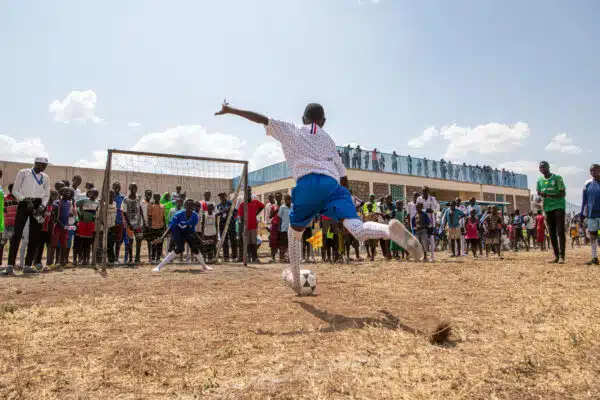
Nyota Katembo (left) in action during a home match against the Montreal Roses FC. © Photo courtesy of AFC Toronto
When Nyota Katembo steps onto the field, everything else fades away; the noise, the pressure, the weight of her past
By Zeba Tasci in Ottawa, Canada
On the pitch, she’s just a player chasing a ball. But off it, she’s become so much more: a role model, a sister, a student, and a voice for a new generation of young refugee women in sport.
“My name is Nyota,” she says simply, with a shy smile. “Yeah, I play soccer. I’ve been playing since I was 10 years old.”
That’s the beginning of a story shaped by resilience, community, and the pursuit of purpose, one that stretches from a refugee camp in Tanzania to the soccer fields of Toronto.
From Tanzania to Quebec: a childhood of transitions

© Photo courtesy of AFC Toronto
Nyota was born in a refugee camp in Tanzania, the youngest of a large family with five brothers and one sister. Her family had fled conflict in the Democratic Republic of the Congo. Eventually, they resettled in Joliette, a small town about an hour from Montreal, Quebec.
“I grew up in Joliette,” she says. “It’s a small place. I did high school in Montreal, then went to the States for four years for university.”
Those early years in Quebec weren’t always easy. Soccer, she says, was a privilege, one her parents worked extra hard to afford.
“Sports in Canada can be very expensive. Soccer wasn’t any different, especially with that many kids. It wasn’t something we could just do. My parents had to really work for us to be able to play,” she explains.
“It was never just a game—it was a reward. I didn’t take it for granted.”
— Nyota Katembo
A family affair: falling in love with the game
Nyota’s love for soccer was sparked by the people closest to her, her siblings.
“With five brothers, soccer was always around me, and at first I wasn’t very interested. I wanted to be a cheerleader” she says, laughing. Eventually, Nyota joined a local youth league, mainly to keep her younger brother company on the pitch. “At first, I was the little sister trying to keep up. But it quickly became something I wanted for myself.”
That sibling connection helped her fall in love with the game, but it also built her confidence.
“I think watching them play made me feel like I could do it too. And then I started finding my own rhythm, my own style,” she says. “My brothers pushed me, encouraged me. We made the most of what we had, even just a ball and an open space.”
Her parents supported her growing passion despite the costs. “They couldn’t always afford the gear or the registration fees, but they made it happen,” she says. “They believed in what the sport could give us, not just physical activity, but a future.”

© Photo courtesy of Nyota Katembo
Finding belonging in the game
For Nyota, soccer became more than a sport. It was a way to feel like she belonged.
“At school, I was always kind of the outlier,” she recalls. “At lunch, everyone would be eating sandwiches, and I’d have rice and stew. People would look and ask, ‘What is that?’ I used to feel a little awkward and just different.”
But on the field, everything changed.
“With soccer, nobody knows who you are or where you come from. It just matters what you do on the pitch,” she says. “It gave me something in common with other girls and helped me make real friendships.”
The sport also helped her siblings adjust. “I came to Canada when I was two, but my oldest brother came at 16,” she says. “Soccer was even more of an outlet for them. A way to express themselves.”
Representing more than herself

© Photo courtesy of AFC Toronto
Now living in Toronto and playing competitively in Canada’s new professional women’s soccer league, the Northern Super League, Nyota is no longer just a player, she’s a face that others can see themselves in.
“I never thought it would be like this,” she admits. “The number of fans, the visibility. It’s amazing.”
What means most to her, though, are the messages from parents and young girls who look like her.
“I get texts saying, ‘You look just like me,’ or ‘You’re someone my daughter can look up to and really see herself in’” she says. “Growing up, I was usually the only Black girl on the team. So now, for little girls to see someone like them on the screen and on the pitch? That’s powerful.”
Staying grounded, giving back
When asked how her refugee background shaped her drive, Nyota reflects without hesitation.
“Whenever you have a story like mine, you stay humble. You know the chances you’ve been given aren’t guaranteed,” she says. “It makes you want to do the most with what you have, to make your parents proud.”
Education has always been non-negotiable for Nyota. “For me, getting my degree wasn’t just a choice. It was a must,” she says. “Because of what my parents sacrificed.”
She hopes to use her platform to keep pushing for visibility, inclusion, and support for refugee and immigrant youth in sport—especially girls.
“Where we come from is a strength, not a weakness,” she says. “We carry something inside of us that drives us to be the best we can be. We just have to embrace it and keep going.”
— Nyota Katembo
From the refugee camp in Tanzania to the soccer fields of Toronto, Nyota’s story is one of quiet strength and boundless potential. And whether it’s by scoring goals, earning her degree, or inspiring the next generation, she continues to remind us all what’s possible when you play with heart and never forget where you came from.





